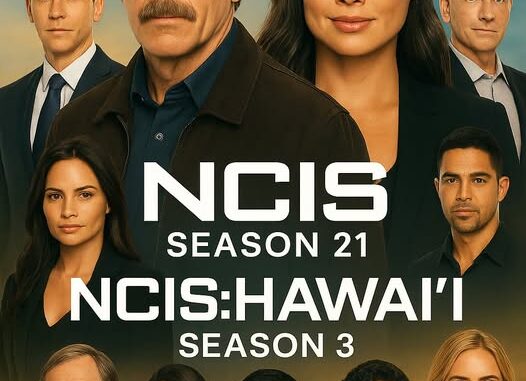
When a show you love disappears off the schedule, it hits like a punch you didn’t see coming. That’s exactly what happened with NCIS: Hawai’i. Despite solid fan love, compelling characters, and a unique setting, CBS pulled the plug after three seasons—leaving many to wonder, why? In this deep dive, we’ll unpack everything: ratings, finances, scheduling, and what it means for the future.
The Cancellation Announcement
The official word came on April 26, 2024, when CBS confirmed NCIS: Hawai’i would be cancelled after three seasons. The final episode aired May 6, 2024.
What CBS Cited as Reasons
Financial Costs
Producing a show in Hawai’i isn’t cheap. Between location, travel, crew costs, permits, taxes, and other logistical expenses, the budget gets hefty. CBS acknowledged “financial costs” as a major factor.
Ratings & Performance
Although NCIS: Hawai’i had a loyal fan base and decent viewership, CBS said the show’s ratings and overall performance didn’t reach levels that justified keeping it on the roster. The third season averaged about 7.78 million viewers in Nielsen’s linear ratings.
Schedule Priorities & Franchise Saturation
CBS has a lot riding on the NCIS brand, and several spin-offs are already in play or launching. With NCIS, NCIS: Sydney, and the upcoming NCIS: Origins, CBS had to choose which shows to prioritize. NCIS: Hawai’i seemed to lose out in that lineup shuffle.
Other Contributing Factors
Shortened Season 3
Due to the Writers Guild of America (WGA) and SAG-AFTRA strikes, season 3 was abbreviated to just 10 episodes. That meant less story arc development and perhaps fewer chances to solidify ratings.
Unresolved Story Hooks
The show’s makers reportedly didn’t know the cancellation was coming when they shot the Season 3 finale, which ends on a cliffhanger. Many character arcs and plot lines remain unresolved.
Economic Impact & Local Production Challenges
The cancellation wasn’t just a hit for viewers—it was costly for Hawai’i’s economy. The show employed hundreds of people, and the industry in Hawai’i relies on such productions. Once NCIS: Hawai’i ended, studios there were abandoned and work dried up.
What Fans & Cast Thought
Cast’s Reaction
Lead actress Vanessa Lachey said she felt “gutted,” “confused,” and “blindsided.”Other cast members echoed her sentiment.
Fan Backlash
Fans launched petitions (like “Save NCIS: Hawai’i on CBS”) and shared disappointment across social media. Many felt that the show still had life and potential.And the cliffhanger ending fuelled a lot of anger.
The Cost vs Benefit Scale
Let’s imagine a scale: on one side, what the show cost (in dollars, logistics, risk), and on the other, what it brought (viewership, prestige, representation, fan loyalty). For NCIS: Hawai’i, the cost side tipped the scale. Even though the show had some strong positives—innovative leadership (first female lead in NCIS), diversity, beautiful scenery, loyal audience—the cost to produce it in Hawai’i plus a crowded franchise schedule made CBS conclude it wasn’t worth another season.
Broader Implications for the NCIS Franchise
Fringe vs. Flagship
The flagship NCIS remains strong. Newer spin-offs like NCIS: Sydney and NCIS: Origins got preferential treatment in renewals. It shows that networks may value freshness or strategic placement more than loyalty or established fan bases.
Representation Matters—but May Not Be Enough
NCIS: Hawai’i was groundbreaking in multiple ways: a female lead, diverse cast, an LGBTQ+ agent storyline, and representation of Hawai’i’s culture.But even strong representation doesn’t guarantee survival if economic and scheduling factors work against you.
Could It Have Been Saved? Alternatives & Hopes
Budget Cuts or Episode Reduction
Industry sources suggested CBS considered a shorter season or reduced costs to salvage NCIS: Hawai’i, but those efforts didn’t ultimately succeed.
Moving Platform or Network
Some fans hoped the show might survive via streaming platforms or be picked up by another network. But so far, there’s no public deal or plan for that.
Petition & Fan Movement
While petitions and social media campaigns showed passion—and maybe even some impact on the discourse—they did not change CBS’s decision.
Why “They’re Putting This On” (or Why the Exit Feels Forced)
Your phrasing—“I don’t know why they’re putting this on”—echoes how many fans feel like the cancellation was abrupt, maybe avoidable, and unfair. Here are some reasons people feel that way:
-
The show ended with serious unanswered plotlines because the writers didn’t know the cancellation was coming.
-
Despite good cross-platform performance, CBS weighed linear ratings and production cost heavily. That mixed metric system sometimes punishes shows with strong streaming or delayed viewership.
-
The decision seems driven more by network strategy—introducing new shows, keeping the NCIS brand “fresh,” balancing schedules—than by any single failure of NCIS: Hawai’i.
What Comes Next for NCIS & Its Fans
-
NCIS: Origins is in the works—a prequel to the original NCIS.
-
NCIS: Sydney continues.
-
There is hope among fans that maybe years down the line, storylines from Hawai’i could be revisited—through specials, spin-offs, or maybe even in other NCIS entries.
-
For the cast and crew, the cancellation is a blow, but many express pride in what the show achieved.

Conclusion
Looking at NCIS: Hawai’i’s cancellation, it wasn’t just one thing—it was a juggling act. Ratings, budget, franchise fatigue, and production logistics all played parts. The show had heart, talent, representation, and fan loyalty—but in the world of network TV, those often aren’t enough to outweigh dollars, cost per episode, and where a show fits in a competitive schedule.
If there’s a lesson here, it’s that even strong shows can be fragile. And that in TV, “why” often means “because of money, planning, and strategy,” even more than it means “because people didn’t like it.”
FAQs
Q1: Did NCIS: Hawai’i end because of low ratings?
A: Partly. Ratings weren’t bad, but according to CBS they weren’t strong enough to justify the high costs of producing in Hawai’i, especially compared with newer NCIS spinoffs and shows with cheaper production.
Q2: Was the cancellation surprising to the cast and creators?
A: Yes. The cast said they were blindsided. The final episode ended on a cliffhanger because they didn’t expect the show to be canceled when they filmed it.
Q3: Could NCIS: Hawai’i come back via another network or streaming platform?
A: There’s been no public sign of that happening. Fans have hoped, and some shows have made comebacks elsewhere, but as of now nothing concrete has been announced.
Q4: How many people did the show employ in Hawai’i, and what is the economic impact of cancellation?
A: Estimates said around 350–400 people in the local industry lost work. It also reduced work at Hawaii Film Studio and related businesses.
Q5: What were some of the unresolved storylines after the finale?
A: The finale left multiple cliffhangers. For example, there was a scene with Jane Tennant’s old mentor, Maggie, waiting to tell Jane something ominous—something viewers never got to see resolved.